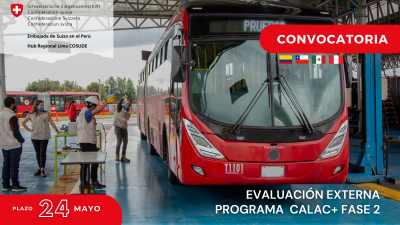The CEELA Project held four on-line workshops on 25, 26 and 29 June, to validate the draft project paper. The Project Inception Phase is now nearly complete and ready to circulate and identify synergies and alliances between projects, programmes and agencies in the four countries where it will be implemented, Mexico, Peru, Colombia and Ecuador. Workshop participants identified key points for the programme’s first phase (2020-2023). The programme is currently in its inception phase.

The workshops were an opportunity for dialogue and participation. Participants included government officials, private sector representatives, academia, community organizations and the private sector of Peru, Ecuador, Mexico and Colombia, plus Swiss Cooperation staff and technical staff from the Consortium led by EBP Schweiz, the Carbon Trust and Efizity, which will support the project in the countries mentioned.
The project aims to reduce energy consumption in the region’s buildings, focusing on hot climate zones (humid and dry), by strengthening capacities for designing energy-efficient and thermally comfortable buildings (EECT), and by applying appropriate technologies and materials.
The CEELA project will be based on three fundamental principles: i) adaptation of international knowledge to local needs, ii) a focus on people and their well-being, and iii) reflecting the main goal (reducing energy consumption) in specific activities; contributing to comply with the Paris Climate Agreement and the implementing the countries’ Nationally Determined Contributions (NDC), aligned with public policies promoted by the Environment and Housing sectors in the countries (Ecuador, Colombia, Mexico and Peru). Finally, this project will help achieve the SDGs, with special emphasis on sustainable cities and communities (SDG 11) and the fight against climate change (SDG 13).
The workshops began with the words of welcome from Martin Jaggi, SDC’s Head of Cooperation. He gave a speech that highlighted the aim of reducing energy consumption and increasing thermal comfort (EECT) in new buildings in Latin America, specifically in Mexico, Colombia, Ecuador and Peru, by strengthening capacities for design, construction and regulations. He also pointed out the importance of compiling stakeholders’ experiences and contributions, which will undoubtedly be of great value for adjusting the CEELA Programme project paper, which will include its first phase activities in each of the countries, and which can be adjusted to their realities, thanks to the input from the regional workshops.
Words of welcome – Workshop in Perú
Dialogue for sustainable construction
Workshops in Ecuador, Peru, Colombia and Mexico
Presentation of CEELA Programme- Workshop in Ecuador
The on-line workshops were designed to gather opinions and experiences, find synergies, define activities and validate proposals, hand in hand with local stakeholders from public and private agencies, civil society and academia from the four participating countries. The countries were originally approached because they are significant in the field of sustainable construction.

The workshops had three sections: i) the welcome and presentation of the programme, ii) group work, and iii) a plenary to share the findings, criteria and recommendations to be taken into consideration in each of the countries, in order to ensure that the programme is adapted to the needs of each country.

The groups focused on analysing and discussing the project’s outcomes: i) Showcases, to find criteria for defining the type of construction and the risks involved; ii) Capacities, knowledge and communication, to define the target population for capacity building which, as each country has a different reality, should have different considerations and criteria; and iii) Regulatory framework, to ascertain each country’s regulatory tools in this field, and its progress or specific needs, in order to promote efficient construction.


Initial conclusions
The three days of on-line sessions made good progress on the points regarding the CEELA Project implementation phase. A full report on these meetings will be published later, detailing the discussion. However, participants in the four workshops agreed on the need to strengthen capacities as follows:
- improving the capacities of those involved in planning and building design
- improving the skills of builders
- strengthening the capacities of those involved in the regulatory process at national and sub-national levels, and decision-makers
- considering the beneficiary (the group to be trained), the knowledge transfer should be online and face-to-face
- giving priority to buildings that consider improving people’s quality of life, according to the SDC principle of seeking to reduce poverty
- initiatives need to be replicable and scalable
- technical knowledge and experience must be transferred at sub-national, regional (Latin America) and global levels
Finally, it is important to emphasize that the project is supported by Switzerland’s experience and expertise in energy-efficiency in buildings over the last four decades. This is the key resource to be capitalized on, besides SDC’s experience with climate change management projects.
With this approach, the project will complement the activities of Swiss Economic Development Cooperation (SECO) in Peru and Colombia.








